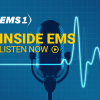Download this podcast on iTunes, SoundCloud or via RSS feed
In this week’s Inside EMS podcast, hosts Chris Cebollero and Kelly Grayson discuss Rural/Metro’s decision to close most operations and lay off 361 EMS employees across Indiana, and what it means for the rest of the industry.
Big companies like Rural/Metro , which have been a staple of the career field for years, are now facing financial problems as reimbursement dries up and they’re not able to make the profits they once could, Cebollero said.
“When you see something like this … it really becomes kind of a challenge to say, ‘what’s going to happen to our career field in the future?’” Cebeollero said.
Grayson agreed, saying that as funding sources dwindle, and more people get added to the health care system under the Affordable Care Act, it’s natural that more people will start using EMS services and put a strain on the system.
“It’s unrealistic to assume you’re going to add that many people to the services and have demand be less,” Grayson said.
“I’ve got the answer,” Cebollero said. “Community paramedics. That’s exactly what we’re banking on.”
They also talked ambulance billing finances, focusing on Va. county fund of $75,000 to cover copays for residents.
“The local county actually put money in place to play their copays, so their citizens don’t have to pay out-of-pocket for EMS services,” Grayson said.
And they mention a Mo. petition to halt outsourcing for ambulance billing, with residents putting pressure on the city’s fire-based EMS service to make it work.
“I think this just goes to show, more and more, as fire thinks that they can do a better at EMS, I think Kansas City has proven that they can’t,” Cebollero said.
In The Clinical Issue, they tackle the pros and cons of 24-hour shifts, and whether they should be eliminated.
“I don’t really know if they have a place in our career field,” Cebollero said.
Grayson agreed, saying the issue goes beyond concerns related to driving.
“There’s a definite link,” he said, “between fatigue, lack of sleep, and increased medical errors.”
Here are links to some of the articles and other items mentioned on the show:












